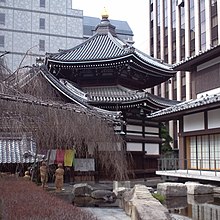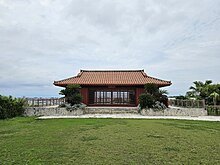Dojo
| Dōjō | |||||
|---|---|---|---|---|---|
"Dōjō" in kanji | |||||
| Japanese name | |||||
| Kanji | 道場 | ||||
| |||||
A dōjō (道場, Japanese pronunciation: [doꜜː(d)ʑoː][note 1]) is a hall or place for immersive learning, experiential learning, or meditation. This is traditionally in the field of martial arts, but has been seen increasingly in other fields, such as meditation and software development. The term literally means "place of the Way" in Japanese.
History

The word dōjō originates from
In
In martial arts

A proper
Many traditional dōjō follow a prescribed pattern with shomen (正面; "front") and various entrances that are used based on student and instructor rank laid out precisely. Typically students will enter in the lower-left corner of the dōjō (in reference to the shomen) with instructors in the upper right corner. Shomen typically contains a
(roughly "dōjō rules") displayed prominently at shomen as well. Visitors may have a special place reserved, depending on their rank and station. Weapons and other training gear will normally be found on the back wall.Honbu dōjō
A honbu dōjō (本部道場) is the central training facility and administrative headquarters of a particular martial arts style.
Some well-known dōjō located in Japan are:
- Kodokan Judo Institute (Judo)
- Aikikai Hombu Dōjō (Aikido)
- Noma Dōjō (Kendo)
- Nakazato Karate Weapons Gym (Shōrin-ryū Shōrinkan)
Other names for training halls
Other names for training halls that are equivalent to "dōjō" include the following:
- Akhara (Indian martial arts)
- Dojang (Korean martial arts)
- Gelanggang (silat Melayu)
- Heya (sumo)
- kalaripayat)
- Sasaran (pencak silat)
- Võ Đường (Viet vo dao)
- Wuguan (wushu)
In other fields
The term dōjō is also increasingly used for other forms of immersive-learning space.
Zen Buddhism
The term dōjō is sometimes used to describe the meditation halls where
- Coding dōjō: a space and associated technique for groups to practice computer programming skills[4]
- Testing dōjō: a space and time where testers work together on a testing challenge[5]
- Agile coaching dōjō: a space where a cross-functional team works for up to three months, surrounded by an agile coach and technical subject matter experts, to learn and practice agile and technical practices[6]
Explanatory notes
- ^ Also [doː(d)ʑoː].
References
- ^ OCLC 1074773870.
- ^ "Meaning of Dojo". Kendo Basics. Kendo for Life. Retrieved 30 November 2013.
- ^ "Martial Arts". Japan Experience. Retrieved 13 November 2012.
- CiteSeerX 10.1.1.568.2621.
- ^ Gärtner, Markus (April 16, 2010). "Testing Dojos". www.shino.de. Retrieved 2018-04-05.
- ^ Bennett, Dan (January 4, 2018). "Agile in approach: Using Dojo principles to find a better path". Thomson Reuters. Retrieved 2018-04-05.
External links
 The dictionary definition of dojo at Wiktionary
The dictionary definition of dojo at Wiktionary

